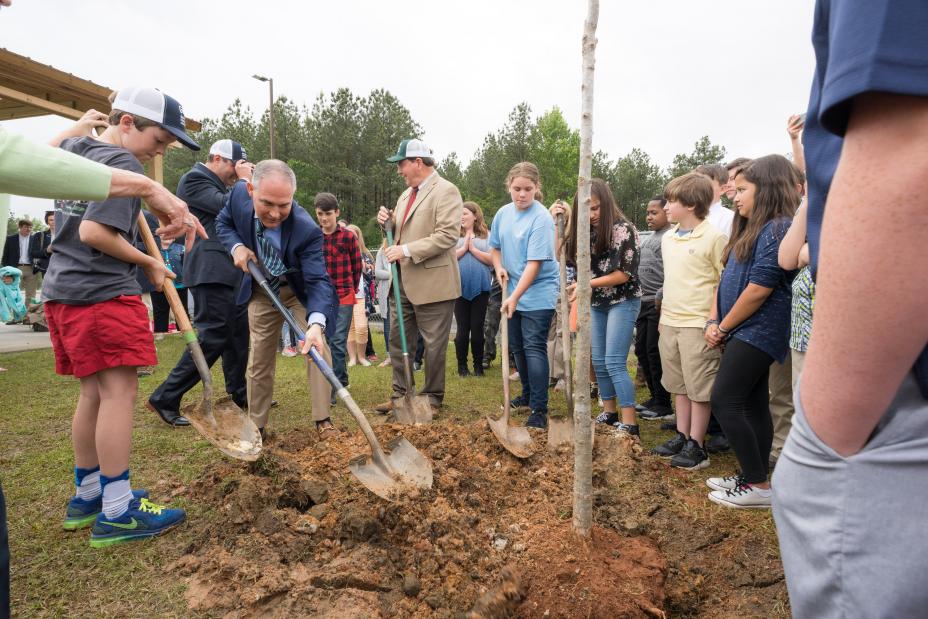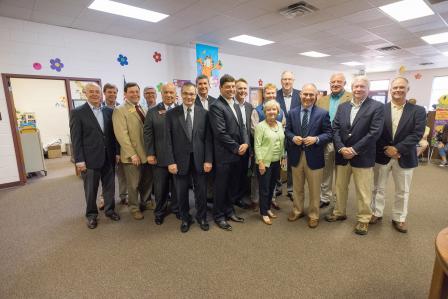News Releases from Headquarters›Office of the Administrator (AO)
Administrator Pruitt Promotes Environmental Stewardship with Forestry Leaders and Students in Georgia
COCHRAN, GA — Today, during a meeting with Georgia forestry leaders, U.S. Environmental Protection Agency (EPA) Administrator Scott Pruitt discussed the importance of environmental stewardship and announced a new decision on the carbon neutrality of forest biomass.
“Today’s announcement grants America’s foresters much-needed certainty and clarity with respect to the carbon neutrality of forest biomass,” said EPA Administrator Scott Pruitt. “Managed forests improve air and water quality, while creating valuable jobs and thousands of products that improve our daily lives. This is environmental stewardship in action.”
In the meeting with members of the forestry community, Administrator Pruitt announced the Agency issued a statement of policy making clear, that future regulatory actions on biomass from managed forests will be treated as carbon neutral when used for energy production at stationary sources. The Agency will also be assessing options for incorporating non-forest biomass as carbon neutral into future actions.
The use of biomass from managed forests can bolster domestic energy production, provide jobs to rural communities, and promote environmental stewardship by improving soil and water quality, reducing wildfire risk, and helping to ensure our forests continue to remove carbon from the atmosphere. This policy will provide certainty to rural communities and the forest industry while supporting economic growth.
“Policy uncertainty means uncertain investment in the future of our forests. When policy limits markets, it puts economic pressure on forest owners. That not only threatens jobs, but it also puts our forests at risk, jeopardizing our water, our air and our wildlife,” said CEO of National Alliance of Forest Owners Dave Tenny. “Recognizing that forest biomass in the U.S. provides a carbon neutral source of renewable energy will encourage landowners to replant trees to keep our forests healthy and intact and provide good paying jobs well into the future.”
“Administrator Pruitt’s announcement today reflects the clear scientific consensus on forest biomass,” said President and CEO of Georgia Forestry Association Andres Villegas. “The Agency’s recognition of biomass as a renewable, carbon neutral source of energy will maintain and enhance markets for small-diameter trees, which encourages landowners to invest in forest health, and ultimately, to keep their land in trees.”
Following the meeting, Administrator Pruitt read The Tree Farmer to a group of over 600 students at Bleckley County Elementary School. Utilizing funds from the EPA’s environmental education grants program, the Gully Branch Tree Farm trained Bleckley Elementary faculty in the Project Learning Tree environmental education curriculum. Afterward, Administrator Pruitt, joined by forestry leaders, students, and faculty, planted a tree and discussed the importance of environmental stewardship.
“We are extremely excited to welcome Administrator Pruitt to Bleckley County Elementary School to celebrate Earth Day. Bleckley County has a long history of commitment to educating our children about our environment. This year, our school received a grant to build an outdoor classroom and to expand our school gardens. Administrator Pruitt’s visit will be one of the highlights of this year. Meeting Administrator Pruitt and hearing him speak will help our students understand, even more, the importance of protecting our environment,” said Bleckley County Elementary School Principal Michele Dyal.
Click here to view the full policy memo on biomass carbon neutrality.
Background:
On April 13, 2017, in accordance with President Trump’s Executive Order 13777, Enforcing the Regulatory Reform Agenda, EPA sought comment on regulatory barriers that should be targeted for repeal, replacement, or modification. Among the over 60,000 comments received, members of the forest and forest products community highlighted a number of concerns with EPA’s past regulatory treatment of the industry. Top concerns included whether EPA had, to date, failed to take proper account of the reality that energy derived from biomass may, in appropriate circumstances, be recognized as carbon neutral, along with the Agency’s own procurement recommendations for wood and lumber products.
EPA’s actions are consistent with principles laid out in the Consolidated Appropriations Act of 2018, whereby Congress explicitly directed EPA, the U.S. Department of Energy, and the U.S. Department of Agriculture to establish policies that “reflect the carbon neutrality of forest biomass for energy production, provided the use of biomass for energy does not result in the conversion of forested lands to non-forest use.” The Agency will continue to check in on the applicability of this policy of treating biogenic CO2 as carbon neutral based on relevant information, including data from interagency partners on updated trends in forest carbon stocks. This policy aligns with numerous U.S. state policies that treat biomass as carbon neutral and some international programs including the European Union Emission Trading Scheme.
For its specific part, EPA has incorporated into its ongoing review of, and improvement to, Clean Air Act permitting programs generally a concerted effort to develop a range of options consistent with a carbon-neutral policy for biomass from forests and other lands and sectors.
Additional Information on EPA’s Policy on Carbon Neutrality:
- U.S forests have been historically, and are currently, a net sink of carbon; in 2015, the forest sector offset approximately 11.2 percent of gross U.S. greenhouse gas emissions.
- Use of biomass for bioenergy can support the management of U.S. forests and can lead to increased carbon sequestration from U.S. forests over time.
- Draft EPA analysis suggests that use of various biomass feedstocks for energy at stationary sources can result in negligible net contribution to atmospheric concentrations of CO2 depending on factors related to feedstock characteristics, production and consumption, and alternative uses.
- Use of biomass feedstocks from managed forests for energy at stationary sources can provide multiple environmental benefits, such as pest management, improved water and soil quality, and wildfire risk reduction.
- Use of these biomass feedstocks for energy at stationary sources can provide numerous economic benefits to rural communities, including new jobs and income from forest biomass industry, and support of existing tourism and recreation industries in forested areas.
- EPA’s previous technical work on a framework for assessing the net atmospheric contribution of biogenic CO2 emissions from biomass feedstocks used by stationary sources for energy production includes an ongoing peer review by EPA’s Science Advisory Board. However, this process has not yet resulted in a workable, applied approach.
- Many forest and forest products industry stakeholders view the lack of a clear EPA policy on the treatment of biogenic CO2 emissions resulting from the combustion of forest biomass for energy at stationary sources as a hindrance to the use of biomass from managed forests for bioenergy purposes, as well as to realizing its environmental and economic benefits.





